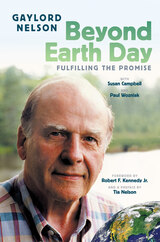
Gaylord Nelson’s legacy is known and respected throughout the world. He was a founding father of the modern environmental movement and creator of one of the most influential public awareness campaigns ever undertaken on behalf of global environmental stewardship: Earth Day.
Nelson died in 2005, but his message in this book is still timely and urgent, delivered with the same eloquence with which he articulated the nation’s environmental ills throughout the decades. He details the planet’s most critical concerns—from species and habitat losses to global climate change and population growth. In outlining strategies for planetary health, Nelson inspires citizens to reassert environmentalism as a national priority. Included in this reprint is a new preface by Gaylord Nelson’s daughter, Tia Nelson.
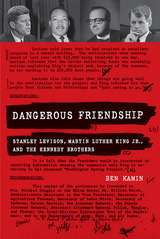
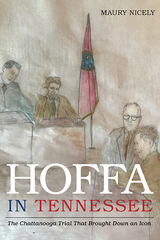
By the early 1960s, Jimmy Hoffa had a stranglehold on the presidency of the Teamsters Union. However, his nemesis, Attorney General Robert F. Kennedy, was convinced that Hoffa was a corrupt force whose heavy-handed influence over the union threatened the nation. As Attorney General, Kennedy established a “Get Hoffa Squad” that set out to unearth criminal wrongdoing by the labor leader in order to remove him from power. A number of criminal trials in the 1950s and early 1960s resulted in not-guilty verdicts for Hoffa. Matters would finally come to head in Chattanooga, Tennessee, in a climatic, but often overlooked, historical moment chronicled by Maury Nicely in this engrossing book.
After a Christmastime 1962 acquittal in Nashville of charges that Hoffa had illegally received funds from a trucking company in exchange for settling a costly strike, it was discovered that several attempts had been made to bribe jurors. Fresh charges of jury tampering in that case were quickly filed against Hoffa and five others. Moved to Chattanooga, the new trial was held before a young, relatively untested federal judge named Frank Wilson. The six-week courtroom conflict would devolve into a virtual slugfest in which the defense team felt was necessary to turn its ire against Wilson, hoping to provoke an error and cause a mistrial. As Nicely shows in vivid detail, Hoffa’s Chattanooga trial became the story of a lone, embattled judge struggling mightily to control a legal proceeding that teetered on the edge of bedlam, threatening to spin out of control. In the end, Hoffa was convicted-an extraordinary change of fortune that presaged his downfall and mysterious disappearance a decade later.
In examining how justice prevailed in the face of a battering assault on the judicial system, Hoffa in Tennessee demonstrates how a Chattanooga courtroom became a crucial tipping point in Jimmy Hoffa’s career, the beginning of the end for a man long perceived as indomitable.

“In most accounts of the tumultuous 1960s, Robert Kennedy plays a supporting role…Sullivan corrects this and puts RFK near the center of the nation’s struggle for racial justice.”
—Richard Thompson Ford, Washington Post
“A profound and uplifting account of Robert F. Kennedy’s brave crusade for racial equality. This is narrative history at its absolute finest.”
—Douglas Brinkley, author of Rosa Parks
“A sobering analysis of the forces arrayed against advocates of racial justice. Desegregation suits took years to move through the courts. Ballot access was controlled by local officials…Justice Rising reminds us that although he was assassinated over 50 years ago, Kennedy remains relevant.”
—Glenn C. Altschuler, Florida Courier
“A groundbreaking book that reorients our understanding of a surprisingly underexplored aspect of Robert Kennedy’s life and career—race and civil rights—and sheds new light on race relations during a pivotal era of American history.”
—Kenneth Mack, author of Representing the Race
“Brilliant and beautifully written…could hardly be more timely.”
—Daniel Geary, Irish Times
Race and politics converged in the 1960s in ways that indelibly changed America. This landmark reconsideration of Robert Kennedy’s life and legacy reveals how, as the nation confronted escalating demands for racial justice, RFK grasped the moment to emerge as a transformational leader.
Intertwining Kennedy’s story with the Black freedom struggles of the 1960s, Justice Rising provides a fresh account of the changing political alignments that marked the decade. As Attorney General, Kennedy personally interceded to enforce desegregation rulings and challenge voter restrictions in the South. Morally committed to change, he was instrumental in creating the bipartisan coalition essential to passing the 1964 Civil Rights Act. After his brother’s assassination, his commitment took on a new urgency when cities emerged as the major front in the long fight for racial justice. On the night of Martin Luther King’s assassination, two months before he would himself be killed, his anguished appeal captured the hopes of a turbulent decade: “In this difficult time for the United States, it is perhaps well to ask what kind of nation we are and what direction we want to move in.” It is a question that remains urgent and unanswered.
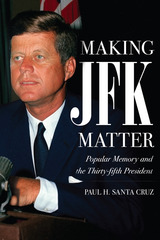
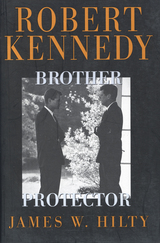
READERS
Browse our collection.
PUBLISHERS
See BiblioVault's publisher services.
STUDENT SERVICES
Files for college accessibility offices.
UChicago Accessibility Resources
home | accessibility | search | about | contact us
BiblioVault ® 2001 - 2024
The University of Chicago Press









